Mixed lot of CDV photos around 1885, Pastor Adolf ESSEN
Description
– See more pictures below! –
They bid on 8 CDV photos (3 motifs double) the Family meal.
One photo is dated 1887, the others are undated (one from around the same time, the others around 1880).
You can see Adolf Essen, later pastor in Elberfeld and Father of the BK theologian Kurt Essen (1904-1993) and des population scientist and Baltic region specialist Werner Essen (1901-1989):
-as a student in Greifswald (photographer Eduard Glaubach, Greifswald, Lange Str. 4); On the back with a personal dedication (SS 1887) to the nurse Charlotte
-as a boy (double motif) and young man (photographer: Ms. Kahlmeyer, Osnabrück, Bahnhofsplatz No. 1).
By the same photographer (Fr. Kahlmeyer, Osnabrück), two motifs come from young women (Charlotte Essen and Karoline Essen), each in duplicate. It is about about sisters of Adolf Essen.
Charlotte Essen, b. 24. June 1867 in Osnabrück as a daughter the master baker Jakob Heinrich Essen in Osnabrück and Marie Charlotte Juliane, née. Diestelkamp (whose marriage took place on the 28th August 1866 in Bockhorst), died on the 2nd March 1945 in Volpertshausen (where Kurt Essen was during World War 3. Reich's pastor was).
Karoline Marie Auguste Essen, born on the 17th May 1870 in Osnabrück, married on the 5th August 1904 in Deutsch-Wartenberg the Berlin pastor Julius Eduard Friedrich Berlin (* 22. December 1852 in Gardelegen, died. on 20. May 1915 in Berlin). She died on the 4th. March 1941 in Gardelegen.
Included is another photo by the same photographer (unfortunately unlabeled); Motive: something older man, possibly the father of Adolf Essen (Master baker Jakob Heinrich Essen in Osnabrück).
Adolf Eduard Heinrich Essen, son of the master baker Jakob Heinrich Essen in Osnabrück (owner of patents for ovens and kneading machines), was pastor in the rural community of Günthersdorf (district) from 1894 to 1902 Grünberg in Silesia), 1904 in Deutsch-Wartenberg and later in Elberfeld (there he wrote numerous popular theological small works); his wife's name was Maria Elisabeth, née. Pätzold. He went to high school in Osnabrück, studied from the 25th. April 1886 to Easter 1888 in Greifswald and then in Berlin theology.
Format (cardboard): approx. 10.5 x 6.4 cm.
Condition: Somewhat stained, ins. good. Please also note the pictures at the end of the item description!
Internal note: Evers CDVs in decorative envelopes
Pictures
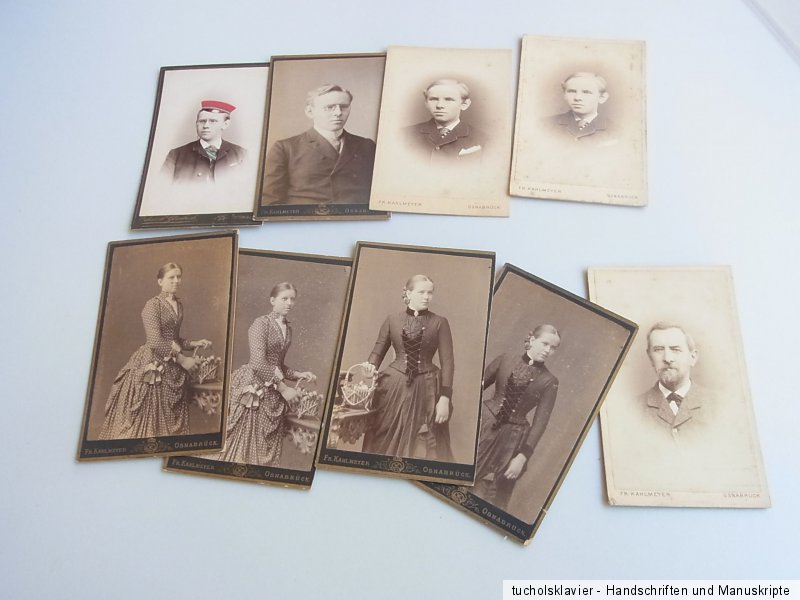
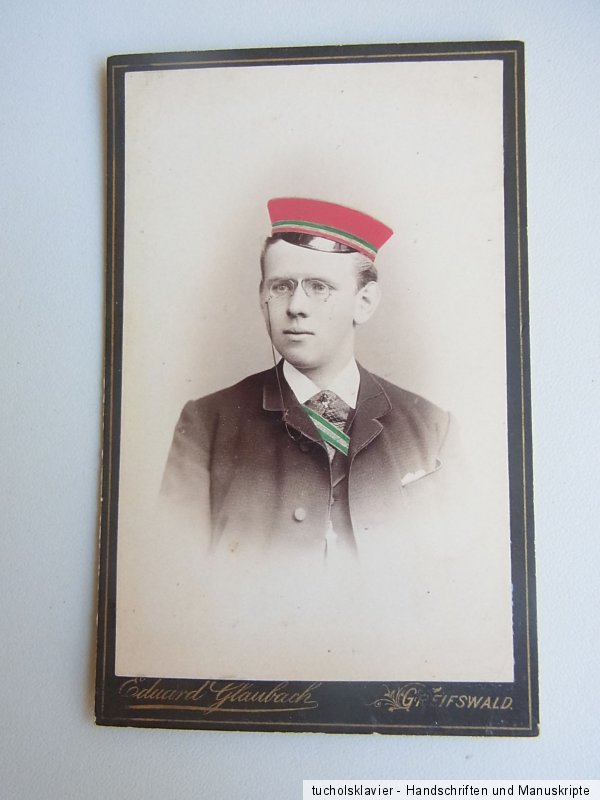
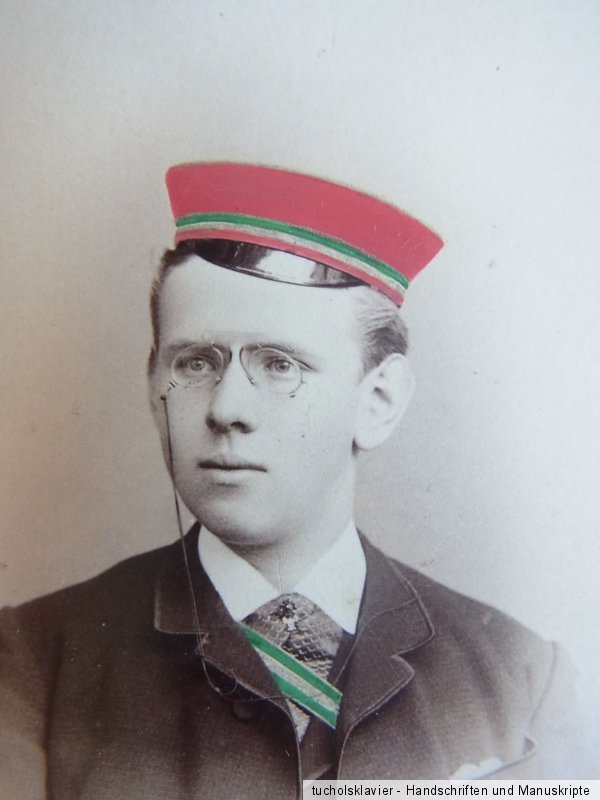
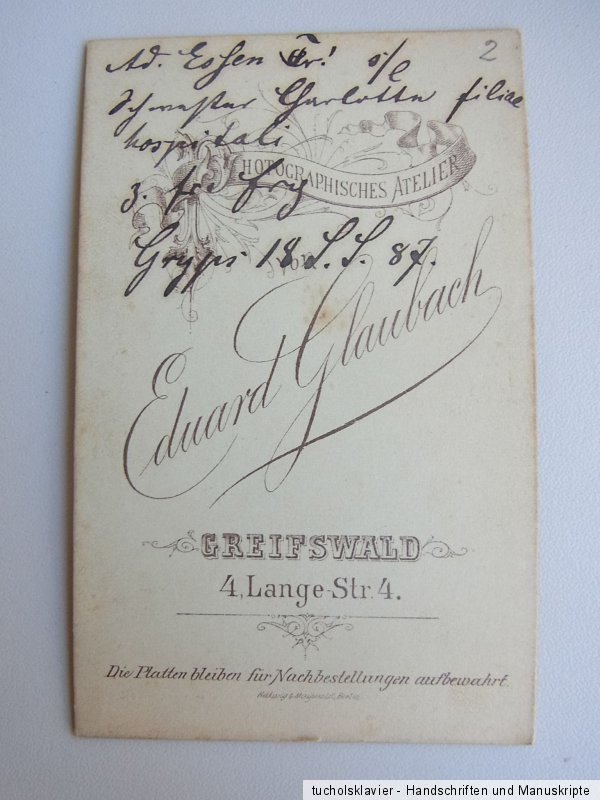
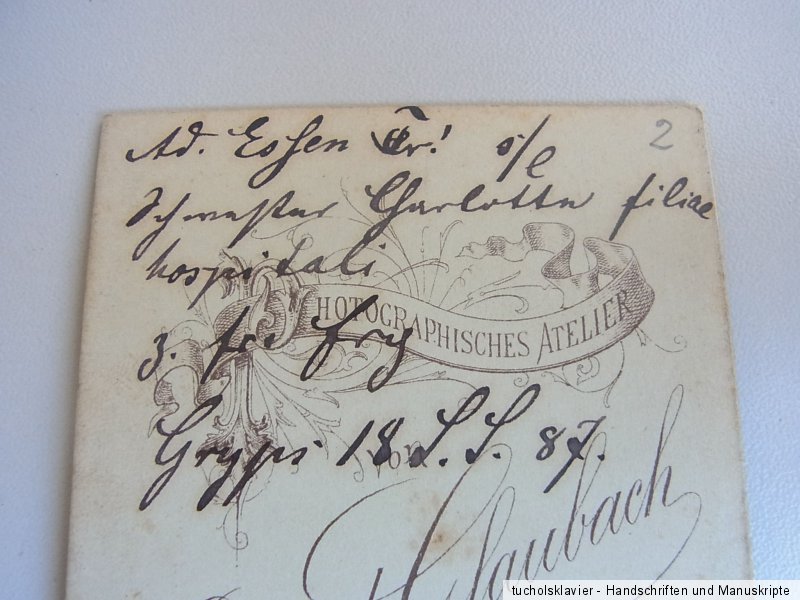
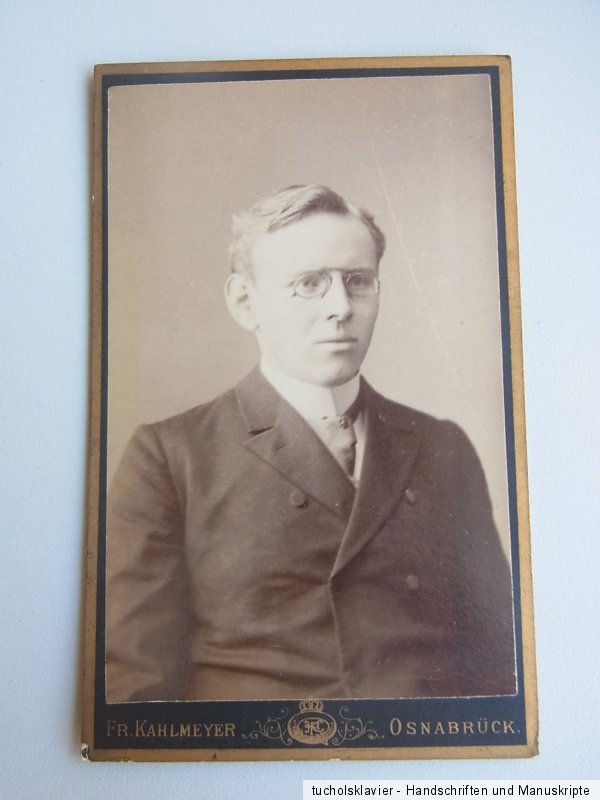
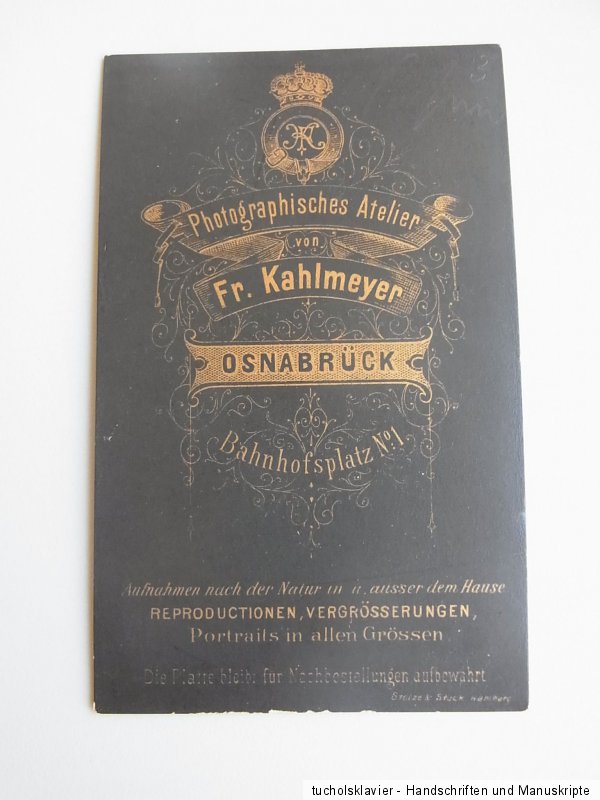
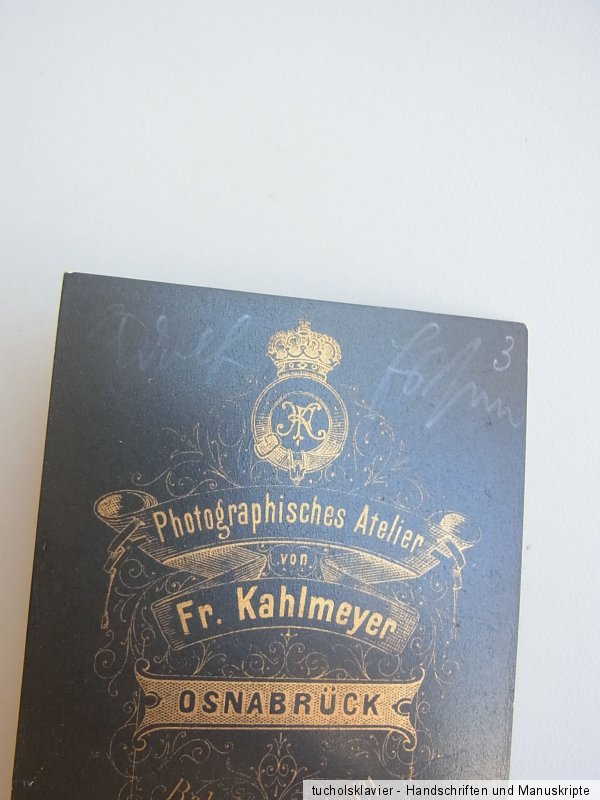
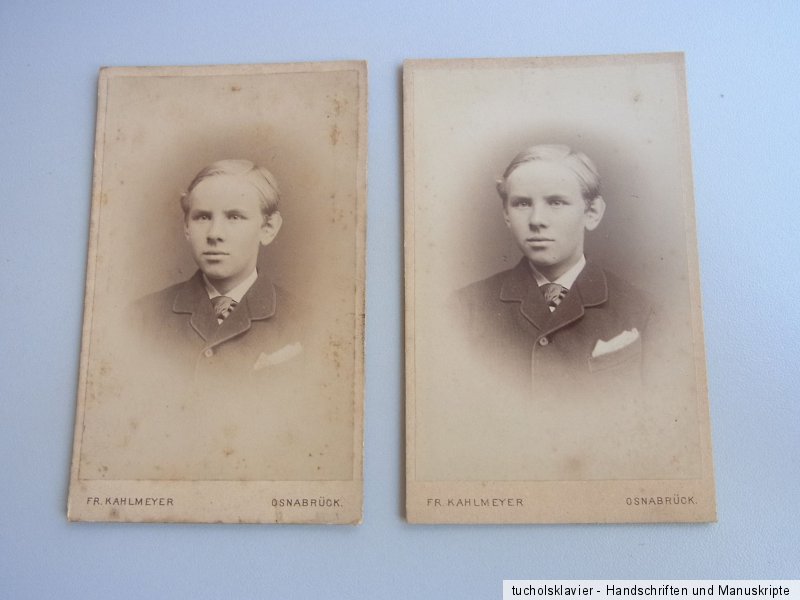
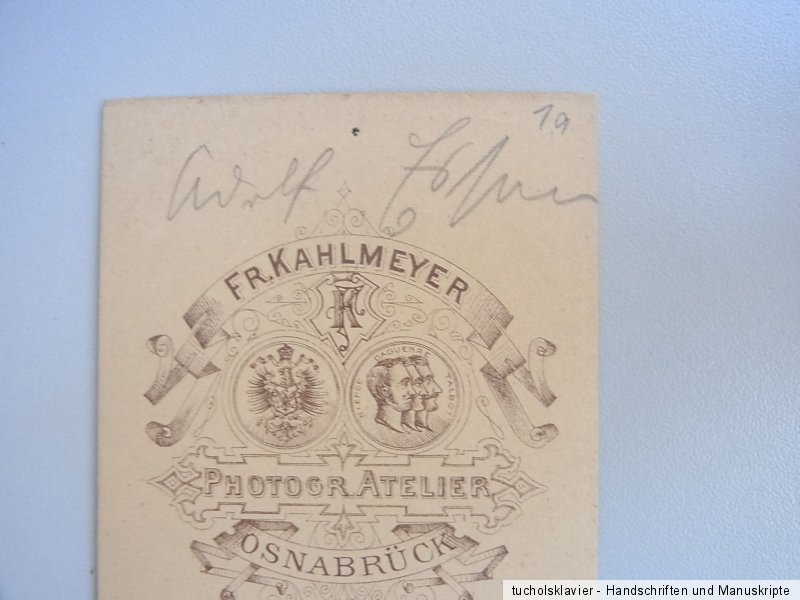
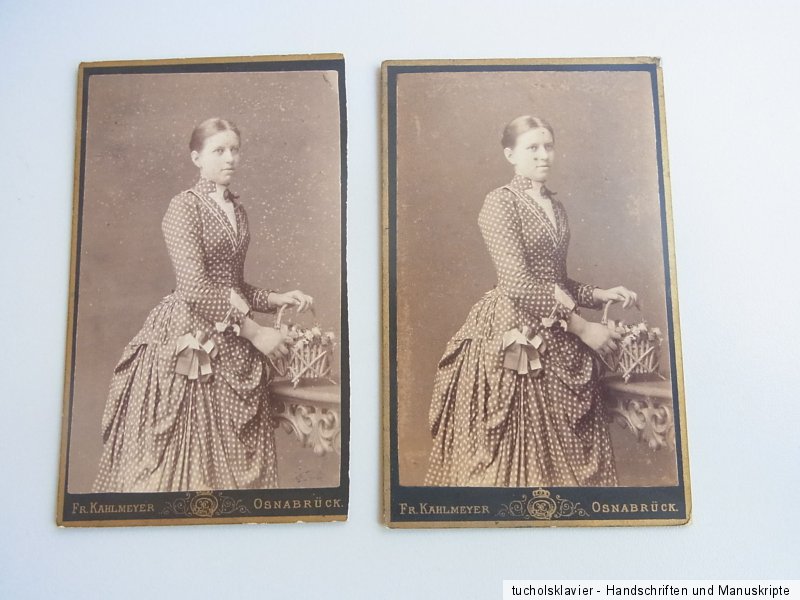
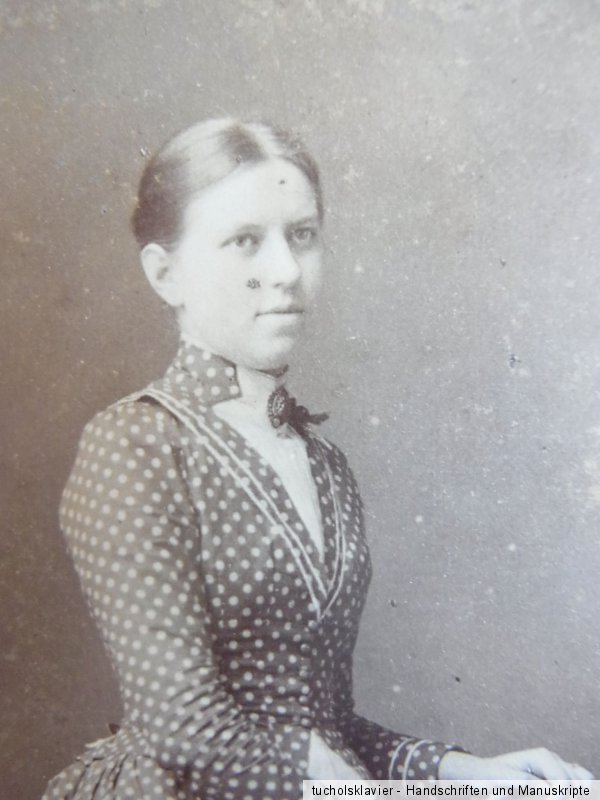
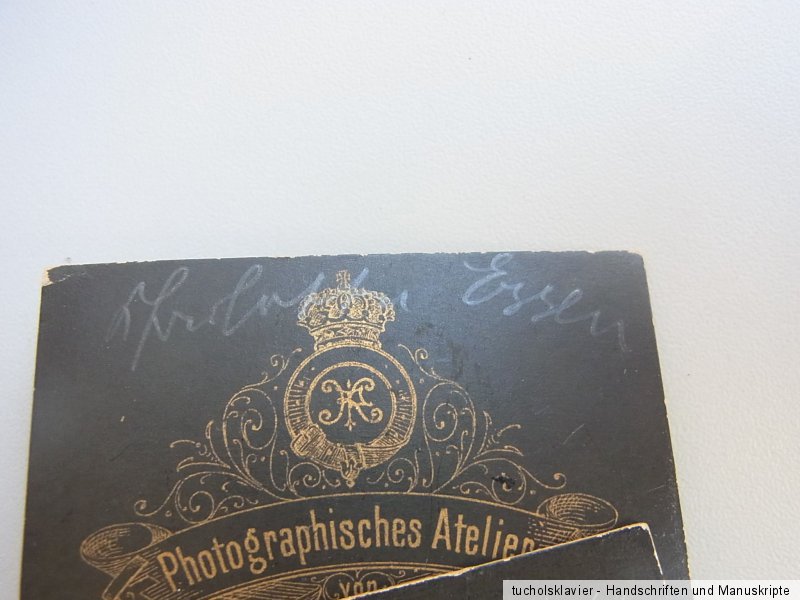
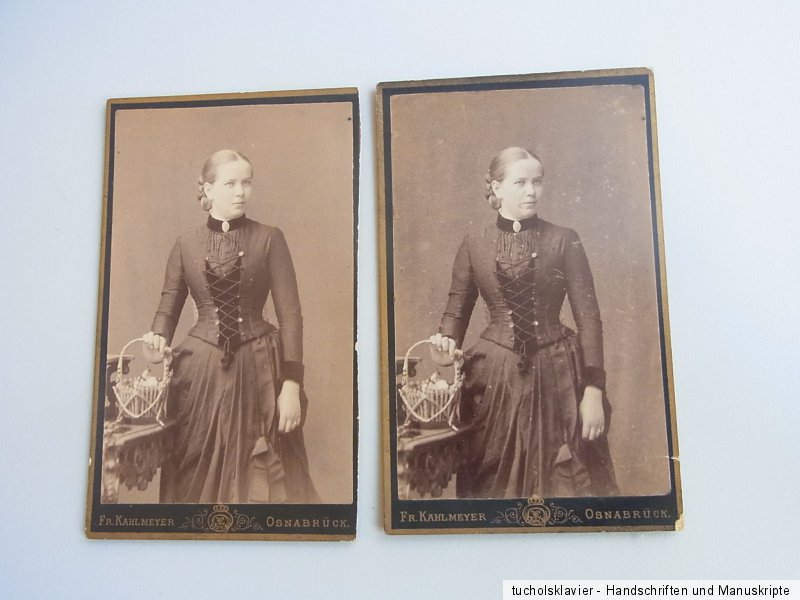
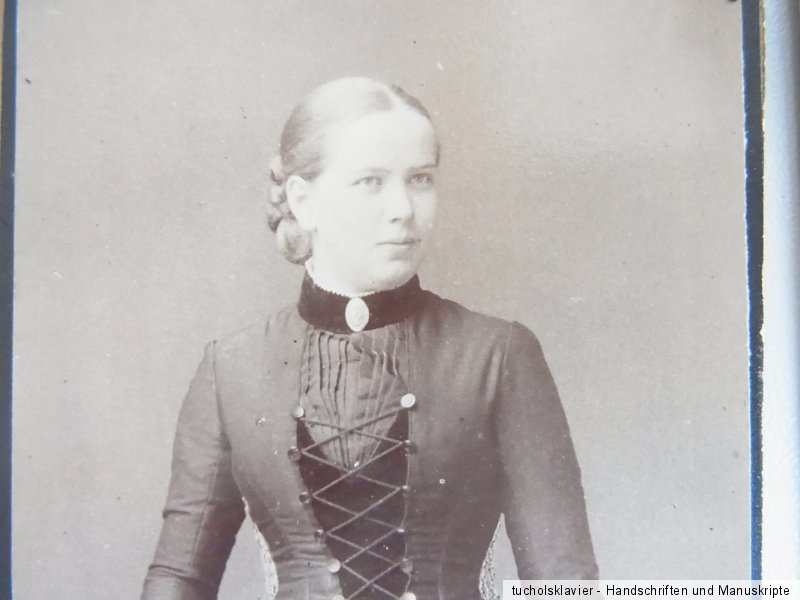
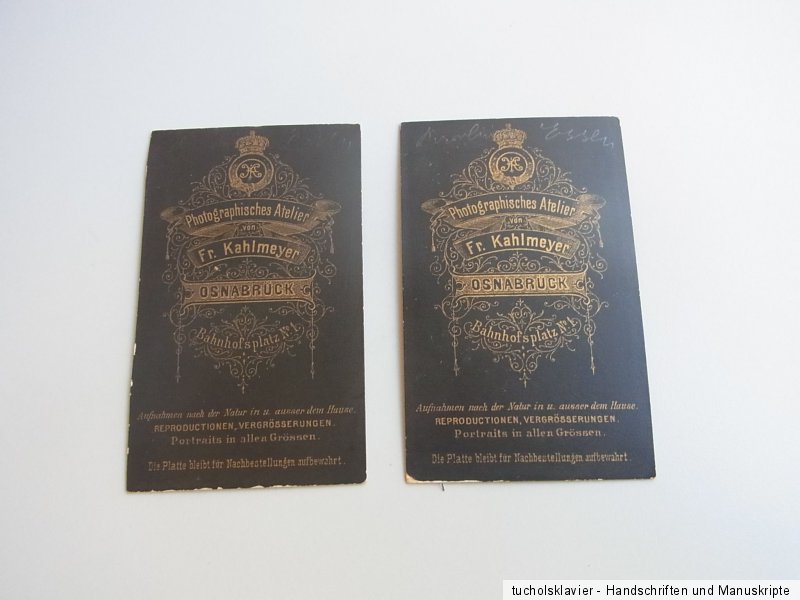
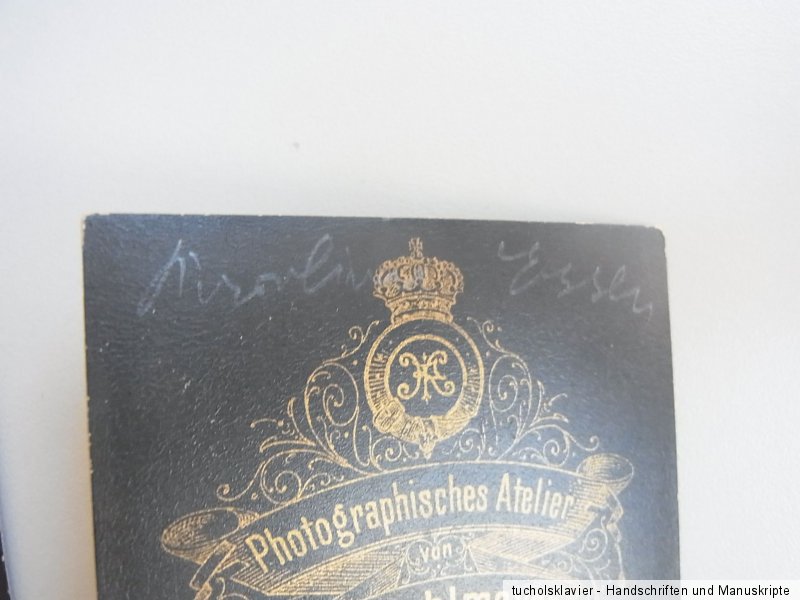
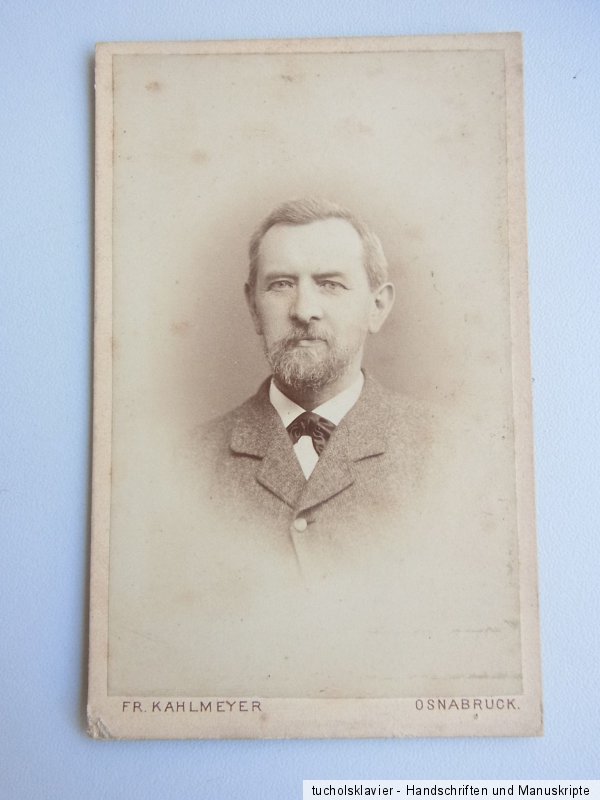
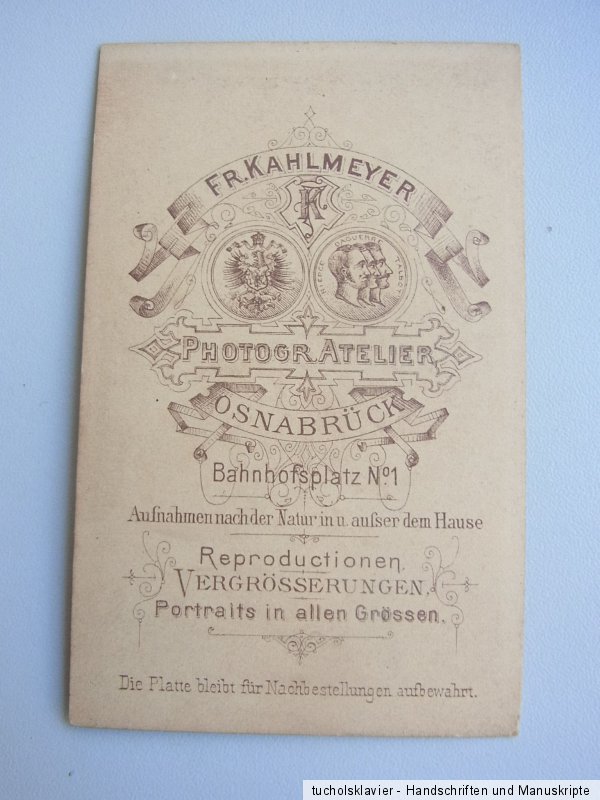
TRIXUM: Mobile-optimized auction templates and image hosting
About Adolf Essen's sons Kurt Essen and Wilhelm Essen (source: wikipedia):
Kurt Essen (*17. May 1904 in Deutsch-Wartenberg (Kr. Grünberg/Silesia); † 26. November 1993 in Duisburg) was a German Protestant pastor, member of the Confessing Church and persecuted by the Nazi regime.
Life and work: Kurt Walter Eduard Essen was the son of the pastor Adolf Essen and a brother of the population scientist Werner Essen. He grew up in Elberfeld. After obtaining his university entrance qualification, he studied Protestant theology, became involved in the youth movement-reformed association of St. George and was then accepted into the vicariate. He gained his first experiences as a preacher in the parishes of Inden, Mülheim/Ruhr-Dümpten and -Saarn. In 1933 he was elected as pastor in the parish of Volpertshausen near Wetzlar. Here he joined the Confessing Church and became a shop steward. This led to clashes with the NSDAP and its subordinate judicial authorities, who took him into custody for four weeks in 1939. Among other things, he was accused of not giving the Hitler salute before confirmation class. The consistory of Düsseldorf did nothing to protect him from this persecution.[1] He escaped further persecution because he was drafted into the Wehrmacht in 1939 and had to do military service.
After the liberation from National Socialism, in 1947 he was elected as pastor to parish IV of the Protestant community of Duisburg, which belongs to the Neuenkamp district, where he worked until his retirement in 1969.
Within his church he worked as a synod member and as a representative for women's aid in Duisburg. As a professed Christian, he belonged to the Church Brotherhood in the Rhineland, which built on the experiences of the church struggle and wanted to spread the ideas of justice and tolerance in post-war society. From 1963 onwards, Essen became a co-founder and board member of the Christian-Jewish Working Group in Duisburg.
Following the declaration of the EKD synod in Weißensee in 1952, he campaigned against the rearmament of the Federal Republic, for the right to refuse military service and became a representative of the peace movement. In 1952 he became second chairman of the working group for peace and against German rearmament in the Duisburg district association. From 1952 to 1954 he was elected as a member of the presidium of the German Youth Congress. Because this organization was associated with the Free German Youth of the GDR, he came to court in 1959 but was acquitted. In 1956 he prepared the Second West German Peace Meeting in Duisburg. He was also a member of the executive board of the Federal Peace Committee. Essen continued to belong to the International Reconciliation Association and the German Peace Society / United War Resisters. He also acted as co-editor of the “Mitnachrichten. International voices for a peaceful solution to the German question" appear.
Instead of Martin Niemöller, Essen took part in the 1952 People's Congress for Peace in Vienna. There he was elected to the World Peace Council, where he served until 1968. In the years that followed, he took part in several peace conferences abroad: in Budapest in 1953, in Stockholm in 1954 and 1956, in Helsinki in 1955, in Tokyo in 1957, in Prague in 1958 and in the GDR. During visits to Eastern Europe in the 1950s, he visited Protestant communities in Czechoslovakia, People's Poland and the Soviet Union. He took an active part in the meetings of the Christian Peace Conference in Prague in 1959 and 1960.
Even in retirement, Kurt Essen worked to spread his beliefs in the peace movement and wrote his memoirs.
Kurt Essen's estate has been there since 1993 or 2002 in the archives of the consistory of his regional church.
Werner Essen (*25. November 1901 in Günthersdorf, Grünberg i. district. Schles.; † 23. September 1989 in Bonn) was a German population scientist and Baltic specialist.
Life
First years, studies and career entry: Werner Essen was the son of Pastor Adolf Essen, who temporarily worked in Elberfeld, and a brother of Pastor Kurt Essen, a member of the Confessing Church. He ended his school career with the school leaving examination in Elberfeld.[1] He sympathized with the ethnic movement early on. After the First World War he joined the Freikorps in 1919.[2] Essen later stated that he had taken part in the suppression of the Spartacus uprising in Berlin and the related unrest in Hamburg, as well as being involved in the Kapp Putsch.[3] In this context, he stated that he had joined the armed conflicts with the Red Ruhr Army in 1920 as a member of the Hacketau Freikorps.[2] As a volunteer in Killinger's assault company, he is said to have been involved in the suppression of the Third Polish Uprising in 1921 during the fighting at St. Annaberg. According to his own statements, Essen was also a member of the Black Reichswehr.[3] He was then demobilized and joined the student battalion in Danzig-Langühr in 1921. He was a member of the Danzig Ostland Guild and planned excursions to the Baltic in this context.
From 1923 onwards he studied mechanical engineering, geography and philosophy at the Gdansk University of Technology. In 1925 he moved to the University of Munich, where he studied geography, anthropology and ethnology until he completed his studies in 1928.[1] According to his own statements, Essen stayed intermittently for three years in Lithuania between 1926 and 1932, where he researched population conditions and settlement areas of the German ethnic group.[3] In Munich he received his doctorate under Erich von Drygalski in 1929 with the dissertation “The rural settlements in Lithuania with special consideration of their population conditions”. phil. doctorate.
From 1931, Essen was employed at the Research Institute for Agriculture and Human Settlement in Lithuania.[4] In March 1931 he called for “Operation in Prussia!” in order to prepare the “resumption of the old flow of Germans and their German cultural values from the south and west to the Prussian East” using the young generation.[5] During his stay in Lithuania, Essen maintained close contact with the National Socialists Walther Darré, Alfred Rosenberg and Erich Koch.[3] He became a corresponding employee at the NS-Landpost and the Preußische Zeitung. He joined the NSDAP at the beginning of December 1931. His “fighting commitment” to the party was certified.[6] After his National Socialist activities became known in Lithuania and the German embassy there, he left the country.[3]
Consultant in the Reich Ministry of the Interior: After the handover of power to the National Socialists, from 1934 he was Eastern and ethnic consultant in the department for border demarcation and ethnicity in the Reich Ministry of the Interior (RMI).[7] From 1936 onwards, his superior was the ministerial director Ernst Vollert. Together with Hans Globke, Essen worked on the Nuremberg racial laws.
Essen was the area representative for Lithuania of the North-East German Research Foundation (NOFG) and was also a member of the Academy for German Law, where he played a leading role in the “Working Group for Nationality Law”. With other experts from this working group in cooperation with other Nazi institutions, he worked out the foundations of a new National Socialist ethnic group policy in strict secrecy, which was intended to be an alternative to the minority policy of the League of Nations.[8] After the attack on Poland at the beginning of the Second World War, the working group rejected plans for a new legal regulation of the “ethnic reorganization of Europe”. On the 8th In December 1939, the working group met with Werner Hasselblatt (legal advisor for the German minorities in Europe), Hermann Behrends (leader of the BDO, deputy head of the VoMi) and Essen (right-hand man of Wilhelm Stuckart in the RMI). At this meeting it was determined that “the entire Polish population could not be destroyed,” but that a reserve should be created for Poland through the General Government. Ethnic Germans and Poles of Nordic character should apply for Imperial German citizenship upon revocation. The Jewish question was addressed, but not finally resolved. It no longer existed for minority politicians.[9]
Second World War - Reich Commissariat Ostland: In 1941 he moved from the Reich Ministry of the Interior to the Reich Ministry for the Occupied Eastern Territories. After the attack on the Soviet Union, he was in charge until World War II. October 1941 the Politics Department in the General Commissariat of Lithuania.[10] From 1941 to 1944 he headed the Space Department (HA II) at the Reich Commissariat Ostland (RKO) in Riga.[11] His area of responsibility included spatial planning, spatial research, statistics, surveying and archiving.[12] He was also responsible for race and settlement policy.[11] From May 1942, settlement plans were drawn up within Essen's department by the spatial planner Gottfried Müller. The spatial planning sketch completed in mid-November 1942 envisaged a comprehensive population exchange in the RKO to the detriment of the Polish population. Lithuanians should be settled in the southeast of their country and the resulting area between Riga and Tilsit should be populated with a "national bridge" of 500,000 Germans. German bases with a total of 300,000 German settlers were to be built from Riga to Leningrad. The Jewish population did not figure in these plans.[13] Ignoring the increasingly unfavorable course of the war in the German-Soviet War, Essen suggested in February 1943 that the Dutch should drain the Pripyt swamps, which, according to Essen, could be used as a “replacement for the eliminated Jewry in the cities”.
As a result of the advance of the Red Army, Essen transferred to the Naugard district office in 1944. Due to the war, he moved from there via Hamburg to Hesse in February 1945.
Post-war period: He was arrested in Hesse in the spring of 1945 by members of the US Army and interned for 15 months. In August 1947 he began research activities and worked particularly for the Göttingen working group and the German Office for Peace Affairs. Essen was one of the co-founders of the Johann Gottfried Herder Research Council in April 1950 and, as a managing board member, also became the first director of the Herder Institute in Marburg in May 1950. After differences with other board members, particularly due to insufficient research activity, Essen was replaced as institute director in May 1951 by Erich Keyser. Theodor Schieder was appointed to the board of the Herder Research Council for Essen.
From 1950 he worked as a minister at the Institute for Spatial Research and was a corresponding member of the Academy for Spatial Research and Regional Planning. From 1951 until his retirement in 1966, he was a ministerial councilor in the Federal Ministry for Expellees, Refugees and War Victims. Until 1967 he was a member of the Association of German Professional Geographers.
Essen was also questioned in 1957 during the public prosecutor's investigation against the former regional commissioner in Schaulen, Hans Gewecke. In his statements, Essen placed sole responsibility for the murder of Jews in Lithuania on Reichsführer SS Heinrich Himmler and stated that the civil administration there viewed this “with disgust”. Essen falsely claimed that the “liquidation of the Jews in Lithuania essentially took place in the short period between the invasion and the start of civil administration (22.7), e.g. T. with the help of Lithuanian forces.”[16] The historian Christoph Dieckmann explains in this regard that the murders of Jews increased after the arrival of the civil administration and were supported by the civil administration.
Essen is listed in the GDR's Brown Book.[17] His estate is in the Herder Institute's document collection.